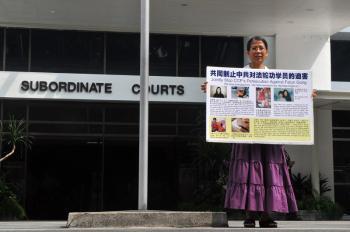UPDATE: Chinese Military Hospital in Lockdown Over Suspected SARS Cases
Netizens in China are raising the alarm about the return of a deadly illness—they say SARS is back in China, and Chinese officials cannot be trusted to keep people safe.
Posts on well-known blog sites such as Baidu, Tianya, and Weibo in mainland China and the Golden Forum in Hong Kong say that: hospitals in China are once again seeing SARS patients; several patients have died; and nearly 100 are quarantined.
SARS—the acronym stands for Severe Acute Respiratory Syndrome—appeared in 2003, infecting over 8000 people in 26 countries, and causing 774 deaths, according to an article in the New England Journal of Medicine, which describes SARS as the 21st century’s first pandemic.
According to the netizens’ posts, SARS has appeared in two spots in northeastern China: Baoding in Hebei Province and in Dalian City in Liaoning Province. Local residents in Baoding also told Epoch Times reporters that there were SARS cases in the area.
According to an article in CNA, the Taiwan news service, on Feb. 23 Taiwan’s Centers for Disease Control asked officials in Beijing to confirm whether SARS has reappeared. Later, the deputy director of Taiwans’ Centers for Disease Control, Zhou Zhihao, announced that China’s Department of Public Health denied there was another outbreak of SARS.
According to a netizen, Hong Kong officials were given the same answer.
Anderson Chen Xingchang posted a message on Sina blog: “Regarding the hearsay that the No. 252 Hospital in Baoding had found SARS patients recently, Hong Kong Department of Health has communicated with China’s Department of Health, and learned that the initial result indicated it was not SARS. Related departments in China will release the information later.”
In response to the official denials, netizens reminded each other of Beijing’s cover-up of SARS in 2003. One of them said, “Be on your guard! If you trust mainland China’s information channel, even if you trust 5 percent of it, you will die. Do you still remember what happened when SARS broke out years ago?”
Cover-up in 2003
On Nov. 16, 2002, the People’s Hospital of Heyuan, in southeastern China’s Guangdong Province. received a patient who was later identified to be the first SARS patient in the world. Several medical staff were infected in turn. However, Chinese officials denied that a deadly plague had been found.
Two and a half months later, SARS spread to the Guangzhou area. To ensure there was no civil unrest during the National Congress and People’s Political Consultative Conference--two important, annual meetings staged by the CCP, none of the major Chinese media reported on the situation.
In addition, Public Security attempted to arrest what it called “rumor mongers.” As a result, during the Chinese New Year travel rush, SARS spread rapidly to all parts of China.
By March 19, 2003, SARS had spread to Hong Kong and Beijing, and Shanxi, Hunan, Guangxi and Sichuan Provinces. Nonetheless, China’s officials claimed SARS was well under control in Beijing.
On April 2, the World Health Organization issued a travel warning, the first global alert against travel in its 55-year history, advising people not to travel to Guangdong or Hong Kong. Around this time the Minister of Public Health, Zhang Wenkang, announced: “It is safe to travel to China and come to China to work.”
After two failed attempts to get China’s media to report the truth, a Chinese doctor in People’s Liberation Army’s 301 Hospital, Dr. Jiang Yanyong, described the real situation to Time Magazine, which published his open letter on April 8, 2003.
Due to international pressure, Chinese authorities had to admit that they had lied about the epidemic of SARS. On one day, the official figure of identified patients in Beijing jumped from 37 to 339 cases, and kept rising until the epidemic ended.
Soon after that, Zhang Wenkang and Beijing’s deputy party head Meng Xuenong were dismissed from their respective posts, as scapegoats for the cover-up. China’s then chairman Jiang Zemin fled to Shanghai in an effort to avoid being infected.
The Epoch Times was onto this story early on, first reporting on SARS in February 2003. In March, when China’s state-run media tried to cover up the truth, and other Chinese media outlets outside China didn’t pay much attention to SARS, The Epoch Times produced more than 300 news articles about SARS, sending out a strong warning to people around the world.
Read the original Chinese article.
